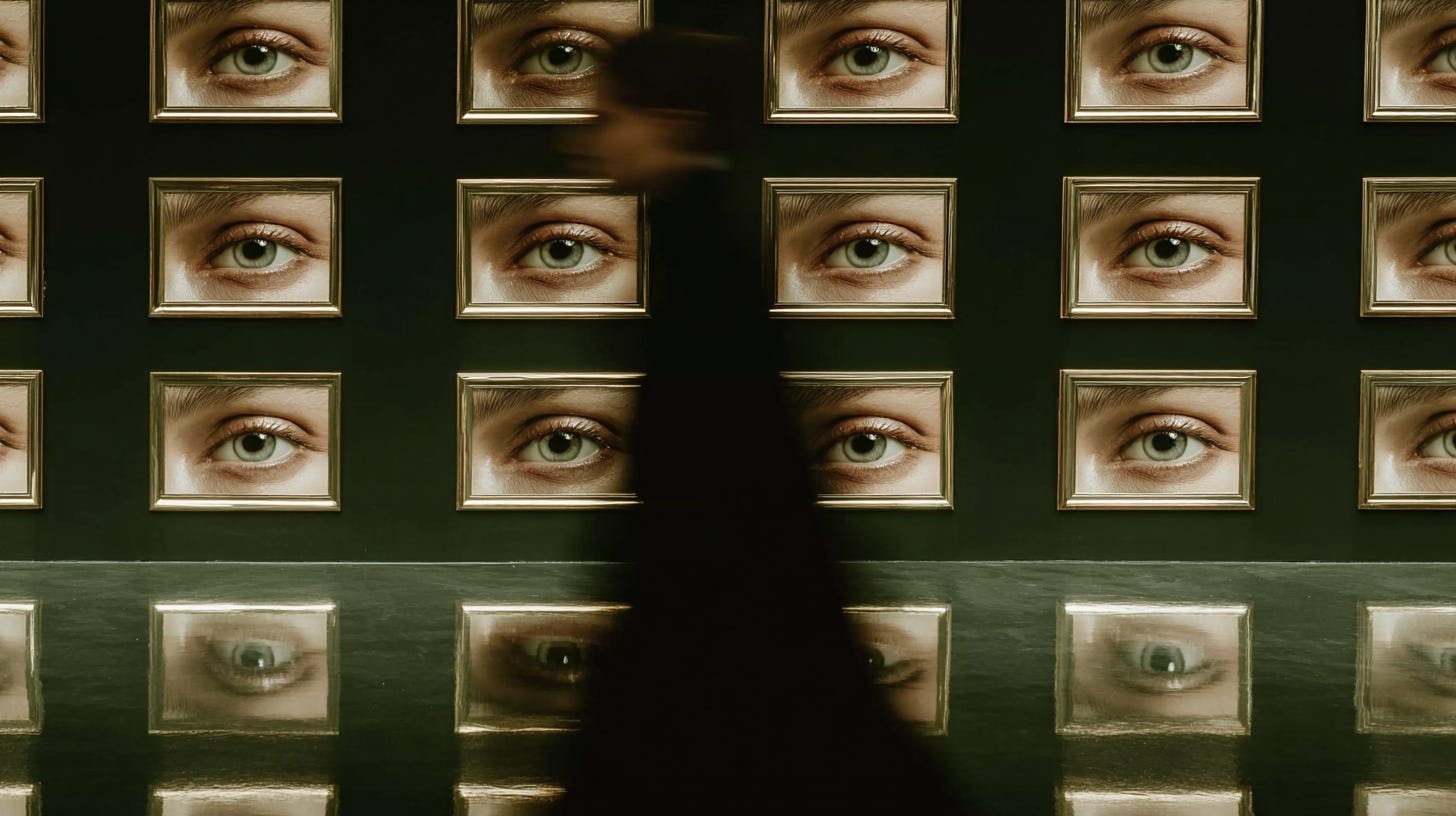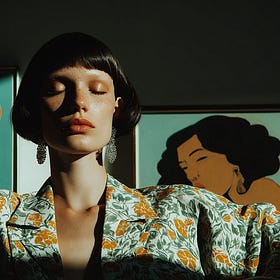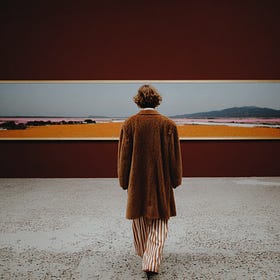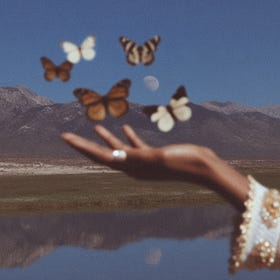Robin Williams was one of the most luminous presences of his generation. He walked onto a stage, or into a film, and the atmosphere changed—an electric current passed through the room, pulling people upward into laughter. His gift was transcendence. Yet when he was alone, away from the camera, another current ran through him: depression, heaviness, despair (compounded in his final years by the neurological disorder Lewy body dementia.) That tension is tragic, yes, but it’s also archetypal. It asks the oldest question in philosophy and psychology alike: is the real self the one we perform, or the one we hide? Was the man who delighted millions the real Robin Williams, or was it the man sitting alone in silence?
The tidy answer—“both”—isn’t quite satisfying, because it dodges the harder problem: how do we talk about a self that seems to fracture across rooms, audiences, and hours of the day? The question predates celebrity culture; it’s older than theater. It’s the ultimate human riddle.
Montaigne was one of the first to take that riddle seriously as a method. He withdrew to his tower after a life in public service and began composing essays that felt like conversations with himself. On the beams above his desk he carved scraps of classical wisdom—portable questions he could live with. Que sais-je? What do I know? It’s not posturing, but rather a form of strategic humility. The self, as he experiences it, slips and recomposes from morning to evening. Fear one day, calm the next. Tenderness toward a friend at breakfast; petty irritation by dusk. He writes to catch these changes in the act. The point isn’t to nail down a permanent essence but to become intimate with the drift. Montaigne’s courage is not certainty; it’s attention. He doesn’t collapse the private and public into a single identity. He accepts the self as weather and builds a practice around watching the sky.
Rousseau raises the stakes. In Confessions (written in the 1760s but published only after his death) he promises to show himself “as nature formed me”—not the heroic mask, but the awkward angles. Envy, vanity, pettiness, sex, theft, humiliation. It’s radical for its time because it treats shame as admissible evidence. Yet even Rousseau’s ferocity carries a paradox: confession is also performance. To open the vein is still to choose where to cut. The scene of exposure must be staged—what to reveal, what to hold back, how to frame the remorse. Rousseau inaugurates a culture of telling-on-oneself that echoes in diaries, memoirs, and now the algorithmic liturgy of social feeds. We parade our “authenticity” not only to purify but to persuade. The confessional self is truer than the heroic self, sure. But it is just a different genre of theater.
The Greeks cut along another line. Aristotle’s lens isn’t confession, it’s formation. Ethos isn’t what you say about your character; it’s what your character does to you over time. Habit—hexis—is the crucible. You are the sum of repeated acts until they become second nature. Not your mood at midnight, not your prettiest thought about justice—your drills. The small movements you do without applause. The hand you extend or keep to yourself when there’s nothing to gain. In that frame, “who you are when no one’s watching” is not an inner feeling but an outer pattern. Character is continuity. If Montaigne gives us intimacy and Rousseau gives us exposure, the Greeks give us practice.
Kierkegaard intensifies the solitude. In The Sickness Unto Death he calls despair the misrelation in the self—a failure to become the self that’s demanded of you. His most uncomfortable claim is simple: there is a stance you take before the Absolute—call it God, truth, conscience—that no audience can mediate. The crowd dissolves. The polite story you tell about yourself collapses. You stand there without costume. In that light, the unobserved self isn’t cozy; it’s heavy. Not a candlelit diary, but judgment day in miniature. Can you endure the demand to become yourself when there is no one to perform for and nowhere to hide? Kierkegaard denies you the comfort of “both are true.” He drags the question into existential territory—less about privacy, more about ultimacy.
And then—us. We inherit all of these traditions in a world that liquefies the boundary between audience and solitude. Danah Boyd’s phrase context collapse captures the new physics: family, coworkers, strangers, and intimates watch the same performance through the same pane of glass. The stage is portable, stitched into the phone; the green dot hums; the quiet room is perforated by potential witnesses. Even when you are alone, you are alone with a narrative you might post later. The self that Montaigne studied in a tower now lives in a hall of mirrors. The self that Rousseau exposed now risks becoming content. The drills Aristotle prized—repetition without applause—are tracked by wearables that applaud for you. And Kierkegaard’s private reckoning is rerouted through dashboards and dopamine, the metrics of a secular confessional.
So does a “no one’s watching” state still exist? Yes—but it’s rarer and more fragile. It appears in unremarkable minutes: the way you wash dishes when no one will thank you, the tone you use in your head when you make a mistake, the micro-choice to close the tab or keep scrolling. The modern trap is to mistake visibility for reality. But the Greeks would insist: what you repeat when the camera is off is chiseling you into someone whether you narrate it or not. Montaigne would say: observe it. Rousseau: tell the truth about it. Kierkegaard: answer for it.
None of these thinkers give us the final word; they give us different instruments. Montaigne offers curiosity. Rousseau, risk. Aristotle, formation. Kierkegaard, ultimacy. Together they sketch a spectrum of the private self—intimate, embarrassing, habitual, existential. What unites them is the insistence that what happens offstage matters at least as much as what’s performed under lights.
Robin Williams remains the cautionary parable: brilliance on the stage does not cancel the solitude off of it. To confuse applause with proof is to outsource your measure to the crowd. And yet the opposite error of fetishizing the hidden self as more “authentic” misses the point too. Both matter. Both shape us. The art is not choosing between them, but learning to see the fracture honestly.
So what’s left of the question—who are you when no one’s watching? Not just a paradox, but a mirror.
Because in the end, your baseline self is the truest measure of whether you’re living in alignment. The words you post, the mask you polish, the face you wear for colleagues or friends—all of that can be skillful, even beautiful. But if the private self that surfaces in unobserved minutes is bitter where you claim gratitude, cowardly where you claim conviction, or careless where you claim care, then the fracture will haunt you.
The point isn’t to abolish performance—it has its place. The point is to close the gap. To let the quiet version of you resemble the version you most respect. To notice where your unobserved habits are drifting you, and to bring them into conversation with your values.
That’s the real invitation: not to declare one self “authentic” and the other “false,” but to integrate them. To make the self in solitude a companion you can live with, not a stranger you’re always running from.
Because the truth is simple, even if it’s difficult: who you are when no one’s watching is the life you actually live. Everything else is just performance.
If you want to take this question further, that’s the work of Week One in THE DAILY 5—a five-minute daily journaling framework I created to map the self with more honesty. The first week is about establishing your baseline: noticing what surfaces when the audience is gone, and tracing the small choices that accumulate into character. Not to judge or fix, but to finally see the unobserved self clearly. If you want to explore that practice alongside me and many others, you can begin here.
XO, STEPF
MORE TO EXPLORE 🐆
the alchemy of a worldview
There's a somewhat startling moment in intellectual development when you realize that most of what you believe isn't actually yours. The political positions, moral frameworks, aesthetic preferences, …
nobody actually knows what they're doing
Before we get into it: nobody actually knows what they’re doing, but the people who figure it out faster are usually the ones paying attention to their own patterns and the patterns that rule the systems around them.
stop sanitizing yourself for other people's comfort
A couple days ago, something insanely cool happened: one of my harshest critics reached out to tell me I'd changed their mind on AI. They went from dismissive comments to genuine engagement with the …












Loved it 🤍
Really good